- Home
- M. D. Lachlan
Wolfsangel c-1 Page 13
Wolfsangel c-1 Read online
Page 13
Odin had felt weak to her, far from his full power. So he could not yet move against her. So what had he done? The girl with the ravaged face who sat by her side in the hanging cave stroked her hand and the answer came to Gullveig in an instant. He hadn’t the power yet to take on any of the witches directly so he was working where he could — at the girls who were being prepared to inherit the runes. If they died then there would be no women to continue the witches’ traditions. Gullveig would eventually be left alone and isolated. While his strength grew, hers would diminish.
She saw it was time to accelerate the pace of the magic. The wolfboy had been prepared. Now he had to meet his holy victim — the prince.
What is magic? Disa had sought to unite the wolfman with the prince so had called the witch. The witch had decided it was time to begin the spell to make her werewolf and so to bring the wolfman and the prince together. Was that a coincidence? Had this conjunction been caused by Disa’s ritual or was it an expression of the witch’s far more powerful magic, which worked away in her deep mind without needing to come to consciousness? Or had it come about through the strongest magic of all — that woven by the fates?
Whatever it was, Gullveig’s desire was now in harmony with Disa’s and it found expression in a spell. Gullveig reached through Disa to touch Vali.
Vali forced his heavy eyes open to watch as Disa’s body convulsed again. She coughed and shook, shivered and growled. Then she dropped onto the floor by Vali and crouched in front of him. She leaned forward, taking his face in her hands. Vali looked into her eyes and was afraid. It wasn’t Disa looking at him, he knew, but something far stranger, and whatever it was exuded cold. Vali felt her hands freezing on his face.
The witch, hanging from the torture rock, tried to work her spell, but Disa’s mind was inadequate to channelling her magic, too fastened to everyday reality. The healer needed to be sent somewhere that would banish her day-to-day consciousness completely and allow Gullveig to work through her.
Vali looked into Disa’s eyes. He could smell something. Burning. Disa, he realised, had pushed the edge of her skirt into the fire, almost surreptitiously, trying to avoid detection until the last moment.
The material caught and the room filled with light and movement and noise. Jodis pulled Disa from the fire, then people were on her, beating at her skirts, trying to extinguish the flames, but Disa was holding them off with one hand, extending the other towards Vali and hissing something under her breath. Two of the men got her down, someone else threw water, but still Disa fixed her eyes on Vali.
Vali felt a cold enter his mind, a creeping feeling of damp and dark. He fell back. Something had gone into him: it felt as though he had a toad stuck in his throat, a clammy, writhing thing that would not be coughed out. The only way to get rid of the hideous feeling was to stand, to go. He was overwhelmed by tiredness but not sleepy. He got to his feet.
His sympathy for Disa was like something on the tip of his tongue, known but distant beneath the nausea he was feeling. He had to move, he knew that. It was like the frustration of being trapped indoors through a long winter storm — dying to get outside but knowing it is impossible — but magnified many times.
He went to the back of the room, where Bragi had hung his sword next to his pack. He picked up both and left. No one followed him; they were all attending to Disa or watching her being attended to.
It was the long twilight of the northern summer. The sky was a pale silver and a big moon hung alongside a single bright star. Already, Vali noticed, the moon was not quite full. He had less than a month to save Adisla.
A large crow flapped from one tree to another and Vali’s body seemed to respond to the movement. Tired beyond thought, he saw himself start walking and noticed that he was going east along the shore of the fjord. Only his forward movement seemed to stop the nausea inside him. After that, he seemed to forget that he was travelling at all.
His movements seemed automatic, unconscious and unguided as he took the road from the village, only dimly aware of his surroundings. He was lost in a trance of thoughts of Adisla, of Disa, of the cold eyes of whatever had looked through her, and he didn’t really notice where he was until he woke.
He stood up, shook the moisture from himself and looked around. There was a depression in the grass. He had slept there, it seemed. It was dusk again. He checked his pack and his sword and looked to the distance. A dark blue range of mountains split the horizon, and he knew that was where he needed to go. The feeling of sickness was still with him and he thought that he wouldn’t bother with food, just go on until he found his wolfman.
He was high up on one side of a steep valley on a slope that, within yards of where he had woken, fell away as a cliff. He moved to the edge and peered down. There were two riders below him and they had made a camp. The men had laid blankets beneath a heavily leafed alder tree and made a small fire. They were preparing to sleep, he thought, taking advantage of the shelter of the tree.
One of them was Authun’s messenger, Hogni. Vali looked up at the mountains. A horse would halve his journey time. He dimly sensed he was enchanted and wondered if that was why his thoughts had suddenly come to clarity. Did the spell, or whatever was controlling the spell, want him to take a horse to speed him forward?
The men hadn’t seen him. It occurred to him to simply walk down the hill and command them to give him their horses. They were, after all, his father’s retainers and so owed him a duty of obedience. But his father had ordered that he should be tested against the wolfmen. Would they agree to give up their animals? And what was to stop them killing him right there if they felt like it? There were other people, cousins and uncles, with claims to Authun’s throne. If one of these men was of their party, Vali thought, they could run a spear through him and go home with no one any the wiser.
His hand instinctively went to his sword. Then he lay flat and waited for the men to sleep.
13
The King’s Men
An hour after the men lay down Vali felt it safe to move. It was just dark, that splinter of night that pricks the long days of the northern summer. A bright moon, full save a slice of darkness on its right-hand side, shone down from a sky of deep stars. He imagined it as the eye of a sleepy god. By the time it had closed to nothing and opened to fullness again, Adisla would be dead, unless he could succeed.
His task wasn’t straightforward. He needed to steal at least one saddle and a bridle from the sleeping men without waking them up, then he had to get to the horses. Catching them would be easy because resting travellers always hobbled their horses by tying a foreleg to a back leg, which prevented the animals from moving faster than a walk, but he knew well that a horse might object — and noisily — to being saddled by a strange rider.
He made his way down the slope as quietly as he could. There was no cover and the glaring moon caught him in its bare light, so he had to rely on the men remaining asleep.
Vali recognised the other sleeper when he got closer — Orri, one of his father’s retainers, who he had seen on his rare visits to Authun’s court. His mind was emerging from the effects of the tiredness and the smoke he had inhaled, and he wondered why the men were travelling by land during summer. Merchants seeking to avoid pirates made the journey overland sometimes, and so did herders and those who needed to travel but couldn’t afford a boat, but nearly everyone who had the choice went by sea. Only when the rivers and lakes froze did the land offer a quicker journey than the water. You’d have to be mad, or enchanted, to walk if you could sail.
Vali crept past the the smouldering campfire and found a saddle and bridle. He had never quite considered just how much metal was on these items before, or the row they made when they moved. They made such a clinking and creaking that they seemed less like horse tack and more like musical instruments. If he was a real thief he would have found it easier just to kill the men in their sleep, he thought. With great care, he withdrew to where the horses were grazing.
The animals were well trained and he had no difficulty approaching one of them, a squat and sturdy beast that looked up to a long ride. He saddled it up as quickly as he could, with half an eye on the sleeping men. The horse made no sound beyond a brief cough of complaint as he tightened the girth on its out breath. Then he bent to undo the rope that connected the horse’s left legs. It was when he stood that he felt the hand on his shoulder.
‘You’ll be mistaken for a wolfman, prowling around like that, prince.’
He span round to see the face of Hogni grinning into his.
For a moment he didn’t know what to say.
The man broke the silence with a laugh and called out, ‘Orri, fetch Prince Vali a drink; he must be parched after his long walk.’
By the fire, which he was stirring to life, Orri waved and picked up a wineskin. Nausea swept over Vali, the taste of Disa’s smoke herbs returning to his throat. He wanted to be away, desperately, but it was more than a natural desire to get on with his mission. It was all he could do not to run northwards. He was certain he was under some spell.
‘A drink isn’t necessary; I’ll just take the horse,’ said Vali.
‘Relax, prince. I have good news for you: your father doesn’t require you to kill any wolfmen.’
‘That wasn’t what you said at Forkbeard’s hall.’
‘No. But what is said in a hall is not always matched by what happens outside it.’
‘I don’t understand you.’
‘It was a deception.’
‘Call it by its name, a lie. It is not manly to lie.’ Vali’s head was swimming. The desire to leave was becoming overwhelming.
‘I was delivering a message, and the message was not sent by your father; it was sent by your mother, Queen Yrsa, so indeed it wasn’t manly, being of a woman.’
Vali focused his eyes on Hogni’s face, trying to make his thoughts do the same. ‘Since when does my mother handle my father’s affairs?’
‘For about four years now,’ said Hogni. He shifted from foot to foot and said, as if afraid the grass would hear him and carry the secret out down the valley, ‘Your father is sick.’
‘In what way?’ Vali’s heart leaped. Was he about to inherit his kingdom? If so, he would send these men back to Forkbeard with a message that he should release Adisla immediately or see Horda longships on his shores before winter.
Hogni didn’t reply.
‘Likely to die?’ The taste of the herbs was strong in his mouth, the tickle in his throat vile.
‘Unlikely to die.’
Vali guessed at the meaning behind the man’s brief reply.
‘Madness?’
Again, no answer. So, it was madness. Vali had heard rumours but he had taken them for just that — things said by the men of Rogaland to make them feel more comfortable with their warlike neighbour. You could hear stories like that about any king, should you bother to enquire.
Vali thought for a moment and then said, ‘So what is required of me? What would my mother have me do?’
‘Simply come home to the court.’
‘She only had to send for me.’
‘This way raises the least suspicion,’ said Hogni.
‘Suspicion of what?’
‘Things are under way that I have no right to discuss. It’s for the queen to speak to you. We meet a ship half a day west of here, and on that we will bring you home.’
Vali nodded. He still wanted the horse but knew that there was no way of getting it other than by deception.
‘Good,’ he said. ‘I’ll be glad to come. Here, let me sit by your fire and share a drink for a while.’
He moved to the fire, sat down and the men offered him the remains of a cooked hare with thick bread. He still had that horrid feeling of sickness in him but he forced himself to eat and to suppress the ‘Thank you’ that Disa had drummed into him. Gratitude was fine for farmers, not for princes. He would rule these men one day and he knew very well that kings took such things as a right.
They ate and the men’s manners and customs seemed faintly strange to Vali. He had been raised among the Rygir, and to him the way Hogni and Orri spoke was slightly odd. He had known, for instance, that the Horda called a cooking pot a hot cup, but it still felt strange to hear it described that way, as if it could never have been called anything else. When the men had finished their meal, they took a tiny pinch of salt, spat, and threw it to the ground, saying, ‘For Loki’s eyes.’
The words struck him as strange. Of all the gods, thought Vali, Loki was the most interesting. He was the sly god, the one who fooled the others, and Vali still loved to hear tales of his cunning. It even struck him as funny that he had killed the beautiful god Baldur for no other reason, it seemed to Vali, than that the perfect one had bored him. When Vali had been a young child, Bragi had beaten him when he laughed at how Loki had contrived to make Baldur stay in the underworld after death by refusing to mourn for him.
‘You like that naughty fellow so much perhaps you would like to share his torments. They lashed him to a rock for his crimes. Shall I so lash you?’ he had said.
Disa had taken Vali in and consoled him. ‘Not everything funny is to be laughed at,’ she said. ‘Well, not out loud anyway. ’
He wondered how Disa was. He couldn’t believe that he hadn’t stayed to help her and hoped she was all right. Had the ritual been worth it? The question seemed to crumble in his mind as he felt the need to look behind him, to the north. That was the direction he had been travelling and where he instinctively felt that he wanted to go. He had to get there. But first he needed to concentrate on his deceit, make these men confident of him.
‘How did you find me here?’ Vali asked Orri.
Orri laughed. ‘There is only one road north in the summer and it’s hardly used, as the merchants prefer the sea. In the winter, when the rivers freeze, then there are a hundred quick paths this way, and your wolfman would be harder to find. In summer, one road, one opportunity for ambush, few travellers. You’d have more difficulty avoiding them than digging them out.’
‘If wolfmen are so easy to find it’s a wonder Lord Authun hasn’t done so yet,’ said Vali.
Hogni waved his hand. ‘The king has other concerns,’ he said.
Vali said nothing more. He knew that the summer would be an easy time to draw down the wolfmen. The reindeer were well fed and energetic, as were all the animals, and their tracks were not so easy to follow. Hunting without a bow or snares — as the wolfmen were said to do — would be very difficult. It was well known the peril they offered was greatest to summer travellers, and this was one of the reasons they had remained unmolested for so long. Kings went by boat in fine weather. Only the poor, the foolish and outlaws suffered from their attacks.
Nausea suddenly took him, as if the toad he had imagined in his throat was alive and kicking to get out. He put down the bone he’d been picking at and tried to stop himself from vomiting. He managed it, just.
‘You are pale, lord. Does our meal disagree with you?’ asked Orri.
Vali composed himself. ‘We will continue to my homeland now,’ he said.
‘We have not slept, lord.’
‘I have,’ said Vali. ‘We will go now.’
The two men made no complaint, got up and put the tack on the horses. As they did, Vali fought down the rising sickness inside him and kept up a stream of questions about Hordaland. Was it true that his father kept wolves as pets (he knew this to be false)? Did traders from the east still come to the Horda? Were the girls of the Horda still pretty?’
‘The rumour is, lord, that you only have eyes for that farm girl.’
Vali made himself laugh. He had turned the conversation just the way he wanted it.
‘She is a useful piece in my strategy with Forkbeard. The weaker he thinks my passion for his daughter, the greater will be her dowry.’
‘You are a cunning man, sir,’ said Hogni, laughing. ‘They say no one in the north is your better at king’s table.’
‘No southern man would beat me either,’ said Vali, mindful that such men as these respected bravado. ‘Now bring me my horse.’
Hogni gave up his mount for his prince without question.
Vali looked across at Orri, who was swinging himself into his saddle. He was a lean man, lightly dressed, no armour, only his spear and helmet. Could he outrun him on a strange and potentially unreliable horse? No.
Vali turned to him. ‘This animal stinks. Give me yours, Orri.’
Orri looked oddly at the prince. ‘This one stinks the same, sir.’
‘I want the horse, not a debate. Get down.’
Vali looked into Orri’s eyes and the warrior thought that he glimpsed a little of King Authun in the prince. Orri dismounted, and as he did so Vali brought his own animal’s hindquarters into the flank of Orri’s horse. The beast stepped sideways, knocking Orri to the ground. Vali snatched the reins, put his heels into his own horse’s flanks and shot forward, taking both animals with him. He was clear of the men in an instant, not even bothering to look back as he urged the creatures on.
They shouted after him.
‘You have sentenced us to death, sir!’
‘We cannot return without you.’
‘The Rygir’s fate is sealed.’
‘They are as the dead!’
He didn’t turn, just kept driving on up the valley, the feeling of sickness leaving him as he moved. He had, he thought, a good chance of getting away. He had two horses, was well rested and would be pursued on foot by men needing sleep.
He reached the top of the valley and found himself on a broad ridge above hills that stretched away to distant mountains skirted by trees, a fjord just beneath him. Did he follow the ridge or drop down to the east? He rode a few steps east, then north. Did he feel any more sick going in one direction than another? He couldn’t really tell.
He allowed the horses to slow at the top of the hill and his mind turned back to the house and Ma Disa.

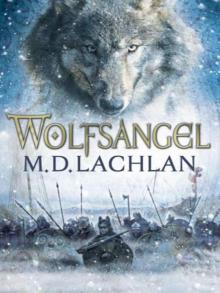 Wolfsangel
Wolfsangel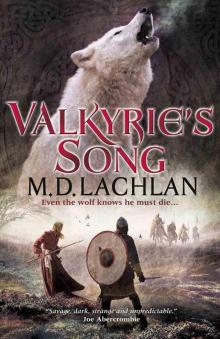 Valkyrie's Song
Valkyrie's Song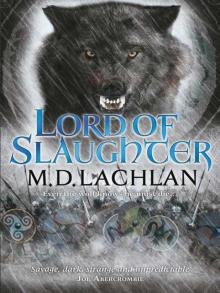 Lord of Slaughter
Lord of Slaughter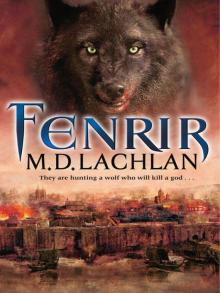 Fenrir c-2
Fenrir c-2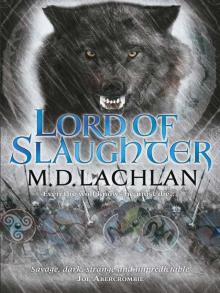 Lord of Slaughter (Claw Trilogy 3)
Lord of Slaughter (Claw Trilogy 3)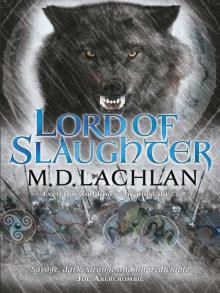 Lord of Slaughter c-3
Lord of Slaughter c-3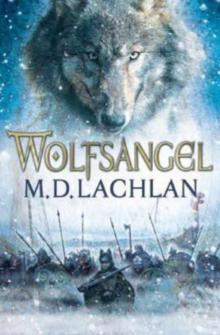 Wolfsangel c-1
Wolfsangel c-1